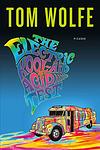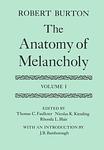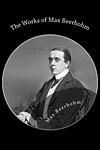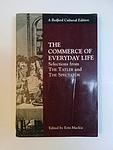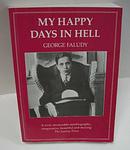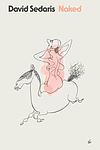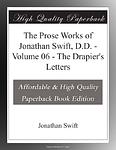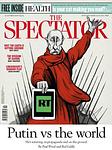The Greatest "Nonfiction, Satire" Books of All Time
Click to learn how this list is calculated.
This list represents a comprehensive and trusted collection of the greatest books. Developed through a specialized algorithm, it brings together 284 'best of' book lists to form a definitive guide to the world's most acclaimed books. For those interested in how these books are chosen, additional details can be found on the rankings page.
Genres
Satire is a genre of literature that uses humor, irony, and exaggeration to criticize and ridicule human vices, follies, and shortcomings. It is a form of social commentary that aims to expose the flaws and absurdities of society, politics, and culture. Satirical books often employ sarcasm, wit, and parody to challenge the status quo and provoke thought and reflection in readers. Satire can be both entertaining and thought-provoking, and it has been used throughout history as a powerful tool for social and political critique.
Countries
Date Range
Reading Statistics
Click the button below to see how many of these books you've read!
Download
If you're interested in downloading this list as a CSV file for use in a spreadsheet application, you can easily do so by clicking the button below. Please note that to ensure a manageable file size and faster download, the CSV will include details for only the first 500 books.
Download-
1. Fear and Loathing in Las Vegas: A Savage Journey to the Heart of the American Dream by Hunter S. Thompson
This book is a semi-autobiographical novel that chronicles the adventures of a journalist and his attorney as they embark on a drug-fueled trip to Las Vegas. The narrative is a wild and hallucinatory exploration of the American Dream, filled with biting social commentary and outrageous antics. The protagonist's quest for the American Dream quickly devolves into an exploration of the darker side of human nature, highlighting the excesses and depravities of 1960s American society.
-
2. The Electric Kool-Aid Acid Test by Tom Wolfe
The book follows the psychedelic adventures of Ken Kesey and his band of Merry Pranksters as they traverse the United States in a painted bus, hosting "Acid Test" parties where attendees are given LSD. The narrative is a vivid exploration of the burgeoning counterculture of the 1960s, capturing the spirit of the era through the lens of this eccentric group and their hallucinogenic experiences. It's a seminal work of New Journalism, blending reportage with literary techniques to create a highly subjective, immersive account of the Pranksters' journey.
-
3. The Praise of Folly by Erasmus
This satirical work is a critique of the practices of the Church and the wider social behavior of the time. Narrated by Folly, the female personification of foolishness, the book humorously criticizes various aspects of society such as superstitious religious practices, scholarly pedantry, and the excesses of the upper classes. The book is a bold critique of its time, using humor and irony to expose the follies of its society.
-
4. Advertisements for Myself by Norman Mailer
This book is a collection of short stories, essays, interviews, and previously unpublished works by a renowned author. It is a self-reflective exploration of his life, work, and philosophy. The author boldly critiques his own work, discusses his political and social views, and provides insight into his personal life. The book, controversial and provocative, serves as a fascinating study of the author's self-perception and creative process.
-
5. Rameau's Nephew by Denis Diderot
"Rameau's Nephew" is a philosophical dialogue that explores themes of morality, societal norms, and the nature of genius. The story revolves around a conversation between a philosopher and a character who is the nephew of a famous musician. The nephew, a freeloader and a parasite, defends his lifestyle by arguing that it is not only acceptable but also necessary in a society where wealth and power determine value. The dialogue delves into the contradictions and ironies of social conventions, challenging traditional notions of virtue, vice, and human nature.
-
6. The Anatomy of Melancholy by Robert Burton
"The Anatomy of Melancholy" is a comprehensive and detailed exploration of melancholy, a term used to describe a variety of mental states, including depression, anxiety, and sadness. The author examines the causes, symptoms, and treatments of melancholy from a variety of perspectives, incorporating elements of psychology, philosophy, history, and literature. The book is notable for its extensive use of classical sources, its humorous and satirical style, and its profound insights into human nature and the human condition.
-
7. The Works of Max Beerbohm by Max Beerbohm
This collection presents the works of a renowned British essayist and caricaturist known for his wit and satire. The book features a variety of his writings, including essays, parodies, and short stories, all imbued with his unique style of humor and keen observations of human nature. Additionally, it showcases his talent as a caricaturist through several illustrations that accompany the text. The book offers a comprehensive look into the author's literary and artistic prowess, highlighting his significant contributions to 20th-century English literature and art.
-
8. Wittgenstein's Nephew by Thomas Bernhard
"Wittgenstein's Nephew" is a semi-autobiographical novel that explores the friendship between the narrator and his friend Paul, who is the nephew of the famous philosopher Ludwig Wittgenstein. The story takes place in Vienna and is set against the backdrop of the Austrian mental health system. The novel delves into themes of sanity, insanity, and the fine line that separates the two, while also offering a critique of Austrian society. It is a meditation on the nature of illness, both physical and mental, and the impact it has on personal relationships and one's perception of the world.
-
9. Les Caractères by Jean de La Bruyère
"Les Caractères" is a collection of character sketches and maxims that satirically depict the manners, foibles, and quirks of the French society in the 17th century. The author's keen observations and sharp wit provide an insightful commentary on human nature and social behavior, with a focus on the court of Louis XIV. The book is renowned for its style, wisdom, and the author's ability to capture the essence of an individual in a few lines.
-
10. The Provincial Letters by Blaise Pascal
"The Provincial Letters" is a series of 18 letters written by a philosopher and mathematician, where he defends his friend Antoine Arnauld, an opponent of the Jesuits, who was on trial before the faculty of theology in Paris for his controversial religious works. The letters mockingly criticize the morals and ethics of Jesuits, and the casuistry they used to justify moral laxity, while also debating various philosophical and theological issues. The letters are considered a masterpiece of French prose and had a significant influence on the French language.
-
11. Selections From The Tatler And The Spectator by Joseph Addison, Richard Steele
This collection brings together a curated selection of essays from two pioneering eighteenth-century periodicals, "The Tatler" and "The Spectator." Conceived and written by Joseph Addison and Richard Steele, these essays offer insightful, witty, and often moralistic observations on society, manners, and literature of their time. Through a blend of satire, criticism, and instruction, the authors aimed to both entertain and edify their readers, promoting virtues such as charity, friendship, and honesty. Their work not only reflects the intellectual and cultural milieu of early 1700s England but also significantly contributed to the development of English prose and the periodical essay as a literary form.
-
12. Roughing It by Mark Twain
This book is a semi-autobiographical travelogue that chronicles the author's journey across the American West to Nevada. It covers his experiences as a miner, newspaper reporter, and lecturer, and includes humorous and insightful observations about the people, places, and culture he encounters. The narrative also provides vivid descriptions of the natural landscape, as well as commentary on the social and political issues of the time.
-
13. The Innocents Abroad by Mark Twain
"The Innocents Abroad" is a humorous travelogue that chronicles the adventures of a group of American travelers aboard a chartered vessel embarking on a grand voyage to Europe and the Holy Land. Through the eyes of the narrator, the book offers a satirical and insightful critique of both the pretensions of the American tourists and the quirks and customs of the people they encounter. With sharp wit and a keen eye for irony, the narrative delves into the clash of cultures and the comical misadventures that ensue as the group navigates through ancient historical sites and European society.
-
14. Sudelbücher by Georg Christoph Lichtenberg
"Sudelbücher" is a collection of thoughts, observations, and philosophical reflections by a prominent German satirist. The book is a compilation of his personal notebooks, where he jotted down everything from scientific observations to social commentary and personal introspection. The author's unique perspective and witty voice provide a fascinating glimpse into the mind of an 18th-century scholar, making this book an important piece of German literature and Enlightenment thought.
-
15. Journey From St. Petersburg To Moscow by Alexander Radishchev
This book is a seminal Russian work that takes the form of a travelogue, documenting the narrator's observations and reflections as he journeys between two major cities. Along the way, the narrator engages with various individuals from different social classes and discusses the social and political issues of the time, including serfdom, the justice system, and the condition of the peasantry. The work is notable for its critical perspective on the social injustices of 18th-century Russian society and is often regarded as a call for reform and enlightenment, which ultimately led to it being perceived as a threat by the authorities, resulting in the author's exile.
-
16. S.C.U.M. Manifesto by Valerie Solanas
The text in question is a radical feminist manifesto that calls for the overthrow of the patriarchy and the establishment of a female-led society. It critiques the male-dominated world, attributing to men various social and moral failings, and proposes the creation of an all-female society as a solution to these problems. The work is known for its provocative and incendiary tone, advocating for drastic measures to achieve its vision of gender equality and female empowerment. It has been both criticized and celebrated for its uncompromising stance on gender relations and has left a lasting impact on feminist literature and movements.
-
17. My Happy Days In Hell by György Faludy
The book is an autobiographical account of a Hungarian poet's life during the mid-20th century, chronicling his experiences from his carefree youth through the rise of fascism and his subsequent imprisonment in a brutal labor camp. It is a tale of intellectual passion, political upheaval, and the resilience of the human spirit in the face of totalitarianism. The narrative captures the author's journey through a Europe ravaged by war and political strife, his encounters with notable literary figures, and his unyielding commitment to his beliefs and to poetry, even as he endures the hardships and absurdities of a communist regime.
-
18. The Harz Journey And Selected Prose by Heinrich Heine
This book is a captivating collection that showcases the keen observations and witty prose of one of the 19th century's most influential German poets and essayists. At its heart is a travelogue that offers a vivid account of the author's journey through the Harz Mountains, blending romantic descriptions of the landscape with sharp social commentary and personal reflections. Alongside this journey, the collection includes a selection of the author's prose, highlighting his critical essays, satirical pieces, and lyrical writings. Through these works, the author critiques the political, social, and cultural climate of his time, all while demonstrating his profound literary talent and innovative approach to narrative and form.
-
19. Fear and Loathing on the Campaign Trail '72 by Hunter S. Thompson
This book is a visceral, first-person account of the 1972 presidential campaign, as seen through the eyes of a maverick journalist. It blends political analysis, cultural commentary, and personal anecdotes to capture the chaotic spirit of the election that pitted incumbent President Richard Nixon against Democratic challenger George McGovern. The narrative is infused with the author's signature gonzo style, characterized by a highly subjective and often satirical approach to journalism. Through a series of articles originally written for a major magazine, the book delves into the machinations of political operatives, the mood of the American electorate, and the dark underbelly of the campaign trail, all while grappling with the broader implications of the American political system.
-
20. Domestic Manners of the Americans by Fanny Trollope
"Domestic Manners of the Americans" is a detailed and often critical observation of 19th-century American society. The author, an Englishwoman, provides a unique outsider's perspective on aspects such as religion, politics, public habits, and lifestyle during her time spent in the United States. The book offers a rich portrait of the country's customs and manners, highlighting both the positive and negative aspects, and has been both praised for its honesty and criticized for its harshness.
-
21. Naked by David Sedaris
"Naked" is a collection of autobiographical essays that explore the author's life from his quirky childhood in North Carolina to his adult experiences in Chicago and New York. The stories are filled with humor, wit, and a keen observation of human nature and family dynamics. The author's unique perspective and storytelling style present a captivating, hilarious, and sometimes poignant look at the absurdities of life.
-
22. Thank You For Not Reading by Dubravka Ugrešić
"Thank You For Not Reading" by Dubravka Ugrešić is a collection of essays that explores the decline of reading culture in contemporary society. Ugrešić delves into various aspects of this phenomenon, including the impact of technology, the rise of celebrity culture, and the commodification of literature. With her sharp and witty observations, she raises important questions about the future of reading and the value of literature in an increasingly digital and image-driven world.
-
23. The Prose Works Of Jonathan Swift by Jonathan Swift
This collection of writings by a prominent 18th-century satirist and essayist offers a diverse range of his non-poetic works, including political pamphlets, essays, and correspondence. The compilation showcases the author's sharp wit, profound disdain for contemporary society and politics, and his exceptional ability to use satire as a means of social commentary. Through his prose, the author addresses issues such as the corruption of the British government, the oppression of Ireland, and the follies of human nature, all while displaying his mastery of language and rhetorical skill. This body of work not only provides insight into the author's mind but also reflects the complexities and concerns of the Enlightenment period.
-
24. The Spectator by Joseph Addison
"The Spectator" is a collection of daily publications from the early 18th century that offers a rich commentary on the social, political, and cultural life of England during that period. Through a series of essays and fictional correspondences, the work provides a platform for discussing various topics such as manners, literature, and public behavior. The central figure, a fictional spectator, observes and reports on the world around him, offering insights and critiques that aim to educate and entertain the readers while promoting moral virtues and enlightened thinking. The publication played a significant role in shaping the English essay as a literary form and had a lasting impact on the social discourse of the time.
-
25. Maxims by François duc de La Rochefoucauld
This book is a classic collection of witty, pithy, and often cynical aphorisms that delve into the nature of human behavior, morality, and society. The author, a 17th-century French nobleman, uses his sharp observations to explore themes such as love, friendship, vanity, and the complex interplay between self-interest and virtue. His maxims reveal the paradoxes and ironies of the human condition, suggesting that our actions are frequently driven by hidden motives and that genuine altruism is rare. The work invites readers to reflect on their own experiences and to question the authenticity of their emotions and actions.
Reading Statistics
Click the button below to see how many of these books you've read!
Download
If you're interested in downloading this list as a CSV file for use in a spreadsheet application, you can easily do so by clicking the button below. Please note that to ensure a manageable file size and faster download, the CSV will include details for only the first 500 books.
Download
